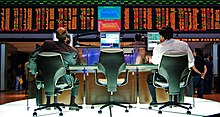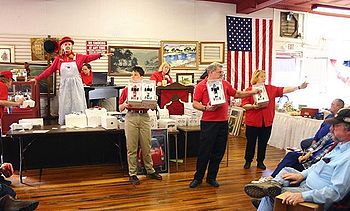
Back بوابة:الاقتصاد Arabic Portal:Ekonomija BS Portal:Economia Catalan دەروازە:ئابووری CKB Portál:Ekonomie Czech Portal:Wirtschaft German Πύλη:Οικονομία Greek Portal:Economía Spanish Portaal:Majandus Estonian درگاه:اقتصاد Persian
The Business and Economics Portal Business is the practice of making one's living or making money by producing or buying and selling products (such as goods and services). It is also "any activity or enterprise entered into for profit." A business entity is not necessarily separate from the owner and the creditors can hold the owner liable for debts the business has acquired. The taxation system for businesses is different from that of the corporates. A business structure does not allow for corporate tax rates. The proprietor is personally taxed on all income from the business. A distinction is made in law and public offices between the term business and a company such as a corporation or cooperative. Colloquially, the terms are used interchangeably. (Full article...) Economics (/ˌɛkəˈnɒmɪks, ˌiːkə-/) is a social science that studies the production, distribution, and consumption of goods and services. Economics focuses on the behaviour and interactions of economic agents and how economies work. Microeconomics analyses what's viewed as basic elements in the economy, including individual agents and markets, their interactions, and the outcomes of interactions. Individual agents may include, for example, households, firms, buyers, and sellers. Macroeconomics analyses the economy as a system where production, distribution, consumption, savings, and investment expenditure interact, and factors affecting it: factors of production, such as labour, capital, land, and enterprise, inflation, economic growth, and public policies that have impact on these elements. (Full article...) Selected article
John Davison Rockefeller, Sr. (July 8, 1839–May 23, 1937) was an American industrialist and philanthropist who played a pivotal role in the establishment of the oil industry, and defined the structure of modern philanthropy. In 1870, Rockefeller helped found the Standard Oil company. Over a forty-year period, Rockefeller built Standard Oil into the largest and most profitable company in the world, and became the world's richest man.
His business career was controversial. He was bitterly attacked by muckraking journalists; his company was convicted in the Federal Court of monopolistic practices and broken up in 1911. He gave up active management of Standard Oil in the late 1890s, while keeping a large fraction of the shares. He spent the last forty years of his life focused on philanthropic pursuits, primarily related to education and public health. He donated most of his wealth using multiple foundations run by experts. He was a devout Northern Baptist and supported many church-based institutions throughout his life. Rockefeller may ultimately be remembered simply for the raw size of his wealth. In 1902, an audit showed Rockefeller was worth about $200 million, compared to the total national wealth that year of $101 billion. His wealth grew significantly after as the demand for gasoline soared, eventually reaching about $900 million, including significant interests in banking, shipping, mining, railroads, and other industries. By the time of his death in 1937, Rockefeller's remaining fortune, largely tied up in permanent family trusts, was estimated at $1.4 billion. Rockefeller's net worth over the last decades of his life would easily place him among the list of wealthiest persons in history. As a percentage of the United States economy, no other American fortune—including Bill Gates or Sam Walton—would even come close. Selected image
Selected economy São Paulo is one of the largest cities in the world economically, and is expected to be the 6th largest in 2025. According to data of Fecomercio/SP, its gross domestic product (GDP) in 2017 was R$699.28 billion ($219.11B today). The biggest financial center in Brazil and one of the biggest financial centers in the world, São Paulo's economy is going through a deep transformation. Once a city with a strong industrial character, São Paulo's economy has become increasingly based on the tertiary sector, focusing on services and businesses for the country. The city is also unique among Brazilian cities for its large number of foreign corporations. Many analysts point to São Paulo as an important global city, even though this assignment can be criticized considering its serious problems of social exclusion and spatial segregation. Although being the most important financial centre of the country, São Paulo also presents a high degree of informality in its economy. (Full article...) Selected quote"Political Economy or Economics is a study of mankind in the ordinary business of life; it examines that part of individual and social action which is most closely connected with the attainment and with the use of the material requisites of wellbeing. Thus it is on the one side a study of wealth; and on the other, and more important side, a part of the study of man. For man's character has been moulded by his every-day work, and the material resources which he thereby procures, more than by any other influence unless it be that of his religious ideals; and the two great forming agencies of the world's history have been the religious and the economic. Here and there the ardour of the military or the artistic spirit has been for a while predominant: but religious and economic influences have nowhere been displaced from the front rank even for a time; and they have nearly always been more important than all others put together. Religious motives are more intense than economic, but their direct action seldom extends over so large a part of life. For the business by which a person earns his livelihood generally fills his thoughts during by far the greater part of those hours in which his mind is at its best; during them his character is being formed by the way in which he uses his faculties in his work, by the thoughts and the feelings which it suggests, and by his relations to his associates in work, his employers or his employees." TopicsRelated WikiProjectsDid you know (auto-generated) -
On this day in business history
General imagesThe following are images from various business-related articles on Wikipedia.
More did you know
Business news Wikinews Economy and business portal
|
© MMXXIII Rich X Search. We shall prevail. All rights reserved. Rich X Search






































